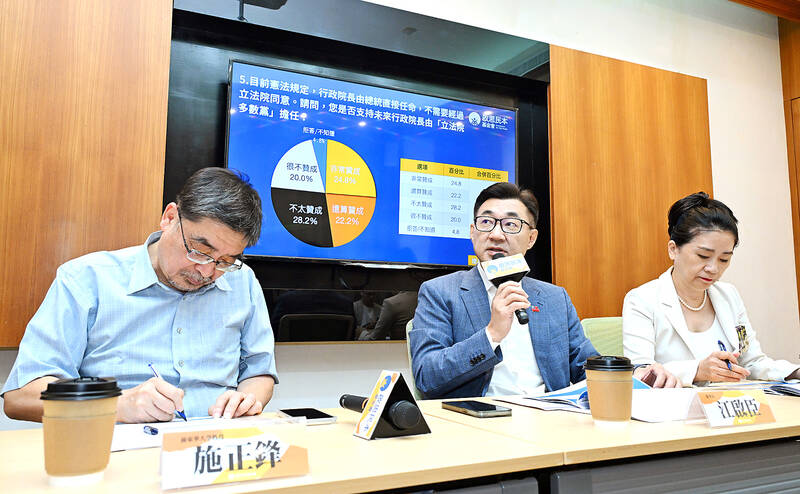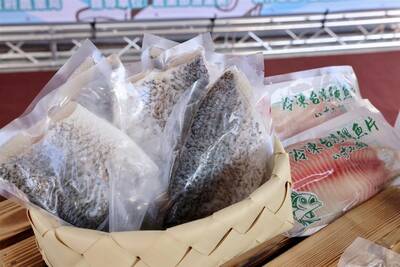Supporters of the Democratic Progressive Party (DPP) favor a presidential system, while respondents who back the Taiwan People’s Party (TPP) or the Chinese Nationalist Party (KMT) tended to advocate a parliamentary system, KMT Legislator Johnny Chiang (江啟臣) said yesterday, citing a survey by the Foundation for the People.
Among respondents who said they backed the DPP, 70.7 percent preferred a presidential system, while 64.6 percent of KMT respondents and 84.2 percent of TPP respondents supported a parliamentary system, said Chiang, who is the foundation’s chairman.
Sixty percent said that the president has power, but is not accountable, while the premier is accountable, but has no power, Chiang said.

Photo: Liao Chen-huei, Taipei Times
Among DPP backers, 39.7 percent agreed that power and accountability were disproportionate, he said.
Asked if disproportionality should be rectified via a constitutional amendment, 82.3 percent agreed, he said, adding that support to remedy the issue transcended political stance, age, education level and gender.
The poll showed that 67.5 percent backed a proposal for the Constitution to require the president to make “state of the nation” addresses at the Legislative Yuan, Chiang said.
A proposal to have the premier, who is appointed by the president, confrimed by the legislature garnered support from 60.5 percent of respondents, he said.
DPP supporters did not favor the president needing to address the legislature or have their choice of premier confirmed by the legislature, he said, adding that both proposals were critical to maintaining a balance of “democratic values.”
Support for the abolition of the Control Yuan was 55.7 percent, with the pan-blue camp split 64.6 percent for abolition and 32.8 percent against, he said.
As for abolishing the Examination Yuan, 59.9 percent of pan-green respondents supported the proposal, while 51.9 percent of pan-blue respondents supported it, Chiang said.
TPP supporters tended to back abolishing both branches, he said, adding that this could be because the ruling party nominates the president, vice president and committee members of both.
Support for thresholds for state-owned businesses and state-affiliated foundations was 91.5 percent, with respondents who backed the idea believing it would prevent pork-barrel politics, he said.
Chiang said that 86.5 percent agreed that special budgets should be heavily restricted to uphold fiscal discipline, with 86.2 percent of pan-green supporters agreeing.
The online poll was conducted on Sunday and Monday, targeting people aged 20 or older. It garnered 1,501 valid responses, and had a margin of error of 2.53 percent and a confidence level of 95 percent.

Taiwan's Vice President Hsiao Bi-khim (蕭美琴) said Saturday that she would not be intimidated by the Chinese Communist Party (CCP), following reports that Chinese agents planned to ram her car during a visit to the Czech Republic last year. "I had a great visit to Prague & thank the Czech authorities for their hospitality & ensuring my safety," Hsiao said on social media platform X. "The CCP's unlawful activities will NOT intimidate me from voicing Taiwan's interests in the international community," she wrote. Hsiao visited the Czech Republic on March 18 last year as vice president-elect and met with Czech Senate leadership, including

There have been clear signs of Chinese Communist Party (CCP) attempts to interfere in the nationwide recall vote on July 26 in support of Chinese Nationalist Party (KMT) legislators facing recall, an unnamed government official said, warning about possible further actions. The CCP is actively involved in Taiwanese politics, and interference in the recall vote is to be expected, with multiple Chinese state media and TAO attempts to discredit the Democratic Progressive Party (DPP) and undermine public support of their recall movement, the official said. This interference includes a smear campaign initiated this month by a pro-Beijing Hong Kong news outlet against

A week-long exhibition on modern Tibetan history and the Dalai Lama’s global advocacy opened yesterday in Taipei, featuring quotes and artworks highlighting human rights and China’s ongoing repression of Tibetans, Hong Kongers and Uighurs. The exhibition, the first organized by the Human Rights Network for Tibet and Taiwan (HRNTT), is titled “From the Snowy Ridges to the Ocean of Wisdom.” “It would be impossible for Tibetans inside Tibet to hold an exhibition like this — we can do it. because we live in a free and democratic country,” HRNTT secretary-general Tashi Tsering said. Tashi Tsering, a Taiwan-based Tibetan who has never

A first shipment of five tons of Taiwan tilapia was sent from Tainan to Singapore on Wednesday, following an order valued at NT$600,000 (US$20,500) placed with a company in the city. The products, including frozen whole fish and pre- cooked fish belly, were dispatched from Jiangjun Fishing Harbor, where a new aquatic processing and logistics center is under construction. At the launch, Tainan Mayor Huang Wei-che (黃偉哲) called the move a “breakthrough,” marking Taiwan’s expansion into the Singaporean tilapia market. Taiwan’s tilapia exports have traditionally focused on the United States, Canada, and the Middle East, Huang said, adding that the new foothold in